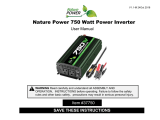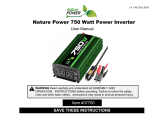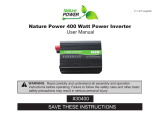Page is loading ...

User Manual
V1.1-M 9Jul2019
R
R Read carefully and understand all ASSEMBLY AND
OPERATION INSTRUCTIONS before operating. Failure to follow the safety
rules and other basic safety precautions may result in serious personal injury.
Item #00

Page 2 of 12
an you for coosin a ature Poer Prouct
This product is designed for certain applications only. The distributor cannot be responsible
for issues arising from modification. e strongly recommend this product not be modified
andor used for any application other than that for which it was designed. If you have a
question relative to a particular application, do not use the product until you have first
contacted the distributor to determine if it can or should be performed on the product.
For technical question please call 1-800-88-00
Reference Part Description Quantity
1
1
00 Inverter
WARNING
This product can expose you to chemicals, including Di 2-ethylhexyl phthalate DEP
which is known to the State of California to cause cancer, birth defects or other reproductive
harm. For more information, go to www.pwarnings.ca.gov
ARNIA
e oo ee eoeo a oo o o ee faao P
e e eao e afoa ae e aa e efeo e aeo oo ao
eoo Paa oee foa aa a agago
PAR I
2
1
User Manual
2
Connecting Cable with Battery Clamp
1
Connecting Cable with 12V Car plug

2.
1. SAVE THESE INSTRUCTIONS.
This manual contains important safety
and operating instructions for inverter
models 300W .This manual will show
you how to use your inverter safely
and effectively. Please read, understand
and follow these instructions and
precautions carefully.
IMPORTANT: Do not use in a marine
application.
3. Keep out of reach of children.
4. Do not expose inverter to rain or snow.
5. Use of an attachment not recommended
or sold by the unit manufacturer may
injury to persons.
6. Do not disassemble the unit; take it to
repair is required. Incorrect reassembly
7. To reduce risk of electric shock, unplug
unit from outlet before attempting any
maintenance or cleaning. Turning off
controls will not reduce this risk.
8. For the most effective use, place the
power inverter on a flat surface.
9. Do not place the inverter on or near
heating vents, radiators or other sources
10. Do not place the inverter in direct
sunlight. The ideal air temperature for
operation is between 50° and 80°F.
11. Only connect the power inverter to a 12V
battery or power supply. Do not attempt to
connect the inverter to any other power
source, including an AC power source.
Connecting to a 6V or 16V battery will
cause damage to the inverter.
12. Do not use the inverter with a product
that draws a higher wattage than the
inverter can provide, as this may cause
damage to the inverter and product.
IMPORTANT SAFETY INSTRUCTIONS
SAVE THESE INSTRUCTIONS.
Page 3 of 12

• ON/OFF rocker switch
• LED indicator
Green indicates Power ON
Red indicates fault in power
• 12 Volt power cord
• 120V standard AC outlets x2
• USB port – 5V, 2.0A
Model 300W includes one port
AR
Page 4 of 12
• High-speed cooling fan(s)
• To keep the inverter cool, the fan turn
on depend on the load on the inverter
or temperature in the inverter. The fans
do not run when the inverter is turned
off. Model 300W uses one fan
The inverter and power source must be in
the OFF mode.
IMPORTANT: Make sure to connect your
inverter only to a 12 volt power supply.
CONNECTING INVERTER CAES
CONNECTING INVERTER CABLES TO
THE INVERTER
1. Locate the Positive and Negative
terminals on the right side of the inverter
2. From the POSITIVE (RED) and the
NEGATIVE (BLACK) terminals, remove
3.
4.
Place the POSITIVE (RED) ring
connector onto the POSITIVE
(RED) inverter terminal. Place the
NEGATIVE (BLACK) ring connector
onto the NEGATIVE (BLACK)
inverter terminal.
top of each ring connector. Put a hex
nut over these and tighten.

+
-
Page 5 of 12

5. Make sure the device to be operated
is turned OFF.
6. Plug the device into the inverter’s
AC outlet.
7. Switch the inverter’s ON/OFF switch
to the ON (I) position.
8. Turn the device on.
9. To disconnect, reverse the above
procedure.
PRAING INRIN
Page 6 of 12
NOTE: If more than one device is to be
powered, start one device at a time, to avoid
a power surge and overloading the inverter.
The surge load of each device should not
exceed the inverter’s continuous operation
wattage rate.
IMPORTANT: Using the inverter
with some rechargeable devices may
damage the inverter and/or device. If
you are using the inverter to operate
a rechargeable device, monitor the
temperature of the inverter for about
10 minutes. If the inverter becomes
abnormally hot, disconnect it from the
device immediately; do not use the
device with the inverter.
. Connect the inverter (see Connecting
Inverter Cables section).
. Switch the inverter’s ON/OFF switch to
the ON (I) position.
. The GREEN LED indicator will light,
indicating the inverter is receiving
power.
. Switch the inverter’s ON/OFF switch to
the OFF (O) position. (The reen ED
may flash briefly andor the internal
speaker may make a brief “beep”. This
is normal.)

Your average automobile battery at full
charge will provide an ample power supply
to the inverter when the engine is on.
Keep the car running at all times when
using the inverter. The actual length of
time the inverter will function depends on
the age and condition of the battery and the
power demand being placed by the device
being operated with the inverter.
When possible, recharge your batteries
when they are not more than 50%
discharged. This gives the batteries a
much longer life cycle than recharging
when they are more deeply discharged.
The power inverter has a battery low
voltage shutdown at 10V±0.5V DC. With
moderate to heavy loads, this will protect
against over-discharging the battery. If the
inverter is running only light loads it is
advisable to recharge before the inverter
low voltage shutdown point is reached.
IMPORTANT: The inverter draws low
amperage from the battery with the main
ON/OFF switch turned on and no load
connected. To prevent battery discharge,
turn the inverter off when you are not
using it.
POWER SOURCE
Page 7 of 12

3.
The Green LED lights up automatically
when the inverter is plugged into a 12 volt
DC power source and is turned on. The
Red LED lights, the alarm sounds and the
inverter automatically turns itself off under
the following conditions:
1.
2.
When the power input from the
vehicle’s battery drops to approximately
10.5 volts, the low voltage alarm will
sound. When the voltage goes down
below 10 VDC, the inverter shuts off.
Recharge or replace the battery.
When the power input from the
vehicle’s battery exceeds 16 volts, high
voltage protection occurs.
The continuous load demand from the
equipment or device being operated
exceeds the continuous load rating of
the inverter. Use a higher capacity
inverter or lower rated device.
4. The thermal resistor exceeds
80° C (176° F.) Allow the inverter to
cool. Do not block the cooling slots or
inverter
Reduce the load on the inverter to
the continuous rated output.
RESET: To reset after shutdown occurs,
switch the inverter’s ON/OFF switch to the
OFF (O) position. Check the source of the
problem and correct. Switch the inverter’s
ON/OFF switch to the ON (I) position.
LED INDICATOR AND SHUTDOWN PROTECTION
Page 8 of 12

MAINTENANCE AND STORAGE INSTRUCTIONS
1. Before each use, ensure that all of the
inverter’s components are in place and
in good working condition.
2. After use and before performing
maintenance, unplug and disconnect
the inverter.
3. Use a clean, dry cloth to wipe external
surfaces of the inverter’s case.
4. Servicing does not require opening the
unit, as there are no user-serviceable
parts. All servicing should be performed
5.
6.
Store inside, in a cool, dry place, out of
the reach of children.
Recycle or properly dispose of internal
electrical components.
Page 9 of 12
IF THE INVERTER’S FUSE BLOWS
which should not have to be replaced
under normal operating conditions. A
blown fuse is usually caused by reverse
polarity or a short circuit within the device
or equipment being operated.
If a fuse does blow, take the inverter to
i

Page 10 of 12
PROBLEM POSSIBLE CAUSE REASON/SOLUTION
Device does not
operate properly
when first connected
to the inverter.
Red LED is on,
alarm sounds,
and/or inverter
does not function.
Poor contact at terminals.
Connections are reversed.
Fuse is blown.
Over voltage protection
Overload protection
Check for poor connection to
battery or power supply. Make
sure connection points are clean.
Rock clamps back and forth for a
better connection.
Unplug the inverter and reverse
the clamps.
See inverter Fuse B ct
See LED Indicator and Shutdown
Protection section.
The inverter may not
have the required capacity
to operate the device.
Turn the inverter switch OFF
and ON, to reset the inverter. If
device still does not operate, the
inverter should not be used with
this device. Use a higher capacity
inverter or lower rated device.
TROUBLESHOOTING

SPECIFICATIONS
Nominal input voltage ................................................................................. 12.8-13.2 VDC
Nominal output voltage ...................................................................................115±10 VAC
Output frequency ............................................................................................. 60 Hz±3 Hz
Operating input voltage ............................................................................... 10.0-15.0 VDC
Continuous output power .............................................................................. Up to 300 W
Surge output power .............................................................................................. 600 W
Waveform ..............................................................................................
..................................................................................................... 87%
Maximum no load current (at nominal input voltage) .........................................<0.60 ADC
Input over voltage shutdown ..........................................................................15.5±0.5 VDC
Input undervoltage alarm ..............................................................................10.5±0.5 VDC
Input low voltage shutdown...........................................................................10.0±0.5 VDC
Output power overload shutdown level ............................................................. 350±50 W
External fuse .................................................................................................................40A
AC receptacles..................................................................................... 2x NEMA 5-15 USA
USB port ........................................................................................................... One, 5V/2A
Cable with battery clamps ............................................................................ 10AWG, 2x23''
Cable with 12V car plug .................................................................................16AWG,1x21''
Page 11 of 12

Please&contact&Nature&Power&Products&to&acquire&
more&information:!
1-800-588-0590
www.naturepowerproducts.com!
Made in Taiwan
Page 12 of 12
LIMITED WARRANTY
Nature Power warrants our products to the original purchaser that this product is free from
defects in materials and workmanship for the period of one year from date of purchase. In
the case of product defect, contact Nature Power customer service to receive
troubleshooting. If defective part or unit should be returned, a Return Authorization
Number must be issued by Nature Power and the defective part or unit should be returned
to the authorized location at the purchasers’ expense. A dated proof of purchase is
required to receive warranty service. Once received at authorized location and defect
proves to be the result of defective material and workmanship, the defective part or unit will
be replaced at warrantors’ option and returned to the original purchaser at warrantors’
expense. No refunds will be granted by the warrantor, In the event of buyers remorse,
please contact your point of purchase and adhere to their return policy.
/






